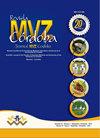牛初乳的质量及其与遗传、管理、生理和冷冻的关系
IF 0.3
4区 农林科学
Q4 AGRICULTURE, DAIRY & ANIMAL SCIENCE
引用次数: 0
摘要
目标。本研究的目的是评估产前初乳质量是否受到遗传、生理和管理特征的影响,以及在冷冻过程中初乳的质量和成分是否发生改变。材料和方法。试验1采集35头奶牛(荷斯坦18头,泽西17头)初乳和血液样本。试验二收集6头荷斯坦奶牛初乳样品,冷冻60 d。结果。泽西岛的平均免疫球蛋白(Ig)浓度为77.65 mg/ml,荷斯坦岛的平均免疫球蛋白(Ig)浓度为82.77 mg/ml。遗传、分娩顺序及其相互作用对初乳IgG浓度无显著影响。在犊牛出生时和3日龄时,奶牛的体重也存在遗传效应(p<0.0001)。在犊牛被动免疫的传播方面,犊牛品种和产犊顺序对犊牛血浆蛋白浓度以及冷冻3天后均无影响。荷斯坦(83%)和泽西(82%)犊牛血清总蛋白水平均在5.5 g/dL以上。单独围场饲喂饲粮的荷斯坦奶牛初乳质量较好(93.57 mg Ig/mL)。随着时间的推移,脂肪百分比在冷冻时降低,实验二的脂肪百分比随着时间的推移而降低(p<0.05)。结论。产前管理对初乳品质有影响,冷冻对初乳的百岁及免疫品质无影响,但脂肪含量随时间减少。本文章由计算机程序翻译,如有差异,请以英文原文为准。
Quality of bovine colostrum and its relation to genetics, management, physiology and its freezing
Objective. The aims of this study were to assess whether colostrum quality is modified by genetic, physiological and management characteristics in the pre-partum period, as well as evaluate whether quality and composition of colostrum is altered in the freezing process. Material and methods. In the experiment I, colostrum and blood samples of 35 cows (18 Holstein and 17 Jerseys) were collected. In the experiment II, six colostrum samples of Holstein cows were collected and frozen during 60 days. Results. The mean immunoglobulin (Ig) concentration was 77.65 mg/ml to Jersey and 82.77 mg/ml to Holstein. The genetic, parturition order, and the interaction between these factors were no significant on IgG concentration in the colostrum. Also, it was observed an effect genetic of cow in the weight on calf at birth and on three days of age (p<0.0001). Regarding transmission of calf passive immunity, no effects of cow breed and calving order were observed on plasma protein concentration of calf, as well as after three days of freezing. Calves of Holstein (83%) and Jersey (82%) breed showed total serum protein levels above 5.5 g/dL. Holstein cows housed in individual paddocks with diet supplementation provided better quality of colostrum (93.57 mg Ig/mL). Over time, the percentage of fat reduced at freezing, that reduced over time (p<0.05) in Experiment II. Conclusions. The pre-partum management exerts influence on colostrum quality, and the freezing not interfere on centesimal and immunological quality of colostrum, with exception the fat, that decrease along the time.
求助全文
通过发布文献求助,成功后即可免费获取论文全文。
去求助
来源期刊

Revista Mvz Cordoba
农林科学-奶制品与动物科学
CiteScore
0.70
自引率
0.00%
发文量
41
审稿时长
6-12 weeks
期刊介绍:
The Journal MVZ Córdoba is an open access international scientific journal financed and edited by the University of Córdoba (Colombia). The journal publishes quarterly, continuously in PDF, XML, Epub, original articles, literature reviews, brief communications and clinical cases, peer-reviewed (double-blind) in Spanish and English, which are related to the agricultural and veterinary sciences. The journal is directed to natural and legal persons of veterinary medicine, animal husbandry, public health, epidemiology, aquaculture, biology, basic biomedical sciences and biotechnology and constitutes a space for academic and scientific discussion around the work of professionals in Veterinary Medicine and Zootechnics. Four-monthly publication.
"The Journal MVZ Córdoba supports the policies for registration of clinical trials of the World Health Organization (WHO) and the International Committee of Medical Journal Editors (ICMJE), since it recognizes the importance of these initiatives for international registration and dissemination. of information about clinical studies, in open access. As a result, since 2007, the journal MVZ Córdoba only publishes clinical research articles that have received an identification number in one of the Clinical Trial Registries validated by the criteria established by WHO and ICMJE, whose addresses are available in the ICMJE website. The identification number is recorded at the end of the summary. "
 求助内容:
求助内容: 应助结果提醒方式:
应助结果提醒方式:


